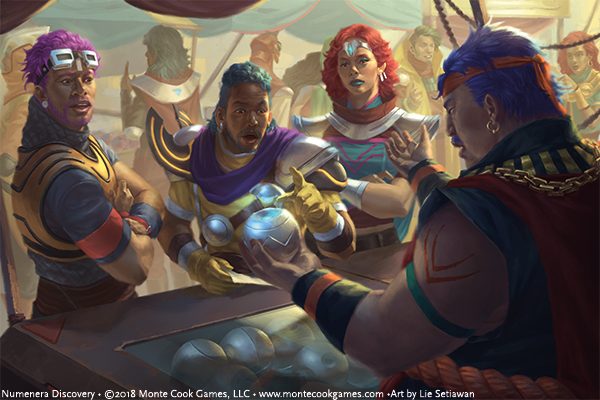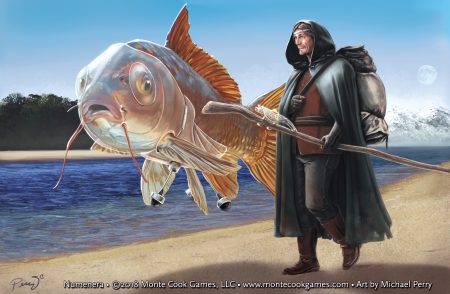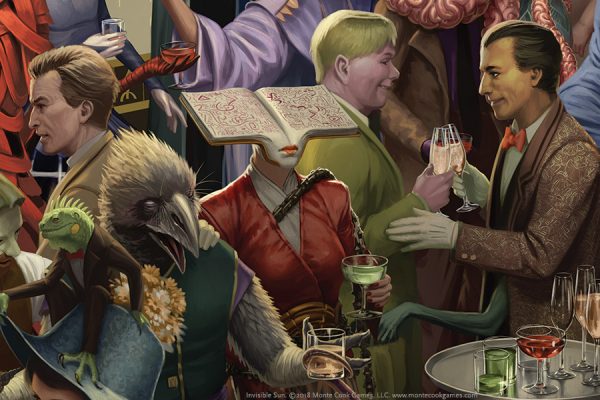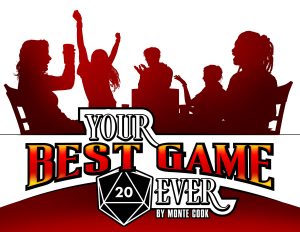This is the second of three articles about quickly creating NPC personalities. You can find the first article here.

An easy way to make a quick nonplayer character (NPC) memorable is to take a character trait and exaggerate it. Any personality quirk you can think of, whether from an actor, TV character, or real person you know, can be played up as the key feature of that NPC. For a one-off NPC, you don’t have to create a nuanced performance. The goal is to quickly create an NPC that seems interesting for the short amount of time the players are dealing with them, which is probably less than five minutes. After all, you could probably describe the personality of any of your friends using only one sentence. That sentence would only scratch the surface of who that friend really is and how they act, but it would give the gist of their personality. For a minor NPC, cranking up that one-sentence concept is all you need to start inhabiting that character.
For example, in college I had a friend who always made the same dumb jokes over and over, and he thought they were hilarious. If you’d stand up from the gaming table for any reason, he’d say, “Hey, thanks for getting up to get me another beer, ha ha!” Every time. If I based a bartender NPC on him, I could skip the bad jokes and instead have her laugh at her own comments. “Four ales for you and your friends, ha ha!” “Oh, you’re wondering what are the new rumors in town, ha ha!” She doesn’t have to laugh at everything she says, but use this habit enough and it becomes a defining trait for the character.
In my hometown, I knew someone who was very curious about things but also immediately judgmental about them. Amplifying that ricochet between interest and dismissal makes it an interesting trait for a knowledgeable merchant NPC. “You’re looking for treasure in the mountains, you say? I don’t like high altitudes; the thin air and cold don’t suit me.” “You want directions to the city university? Head toward the south end of town, but don’t expect them to tell you anything practical.” “You’re a priest? I’ve never had much use for religion.” Juxtaposing someone who knows a lot of casual information but is slightly annoying sets up an interesting dynamic for the players.

One of my friends since I was a kid loves going fishing and always finds ways to bring a conversation back to fish and fishing. You could take any campaign-appropriate subject—a celebrity, a popular theater show, a specific church or religion, a hobby, or even a color or type of creature—and give any NPC an obsessive interest in talking about it, such as a librarian who always talks about moths, even if what they’re saying probably isn’t true. “Moths kept eating the pages of rare books, so we had to paint the covers with a mild poison. Be careful!” “There’s an entire category of angels that have moth wings instead of bird wings, isn’t that amazing?” “I found that book on dream magic, it was fascinating. Did you know that moths dream just like humans do?” Some players might enjoy this quirk, and others might decide the NPC is too weird to talk to.
If you pay attention to how the players react to these characters, it gives you something to build on for the rest of the encounter and later encounters as well. Do they think the laughing bartender is nervous—or hiding something? Do they think the contrarian merchant actually dislikes what they’re asking about—or are they trying to warn the PCs away from a bad situation? Is the lepidopterist librarian a member of a moth cult—or just someone who knows a lot of unusual moth facts?
If the players end up liking that NPC and make a point to interact with them later, you can add more details and subtlety about how the NPC is presented. The laughing bartender can be serious the second time around because she’s worried about a friend or family member. The contrarian merchant can turn friendly if the PCs agree with their negative assessment. The moth-loving librarian might actually know a lot about other insects as well, and the first conversation just happened to be about moths. Any of these traits and NPC connections might turn into a plot hook.

Remember that you don’t need to do this for every NPC. Most of the background characters the PCs interact with don’t need any screen time and the dialogue doesn’t have to be memorable. (Or, to look at it another way, if everyone the PCs meet is a caricature, then the campaign starts to feel like a farce.) In games and in real life, some people aren’t that interesting to talk to, and you shouldn’t waste game time presenting a boring person. The town guard who gives directions to the castle or the merchant who sells rope might be mentioned in passing, but they don’t need any lines of dialogue to fulfill their very minor roles in the campaign.
In two weeks, tune in to get more advice on bringing your NPCs to life!
Although we’re on break next week, we’ll bring forth a cool article from the archives to keep you entertained in our absence!
 Hungry for more ideas to enhance your games? You’ll want Your Best Game Ever, a beautiful 240-page book of advice and tools for gamemasters and players of any and every RPG. Preorders open on BackerKit soon—sign up here to get notified!
Hungry for more ideas to enhance your games? You’ll want Your Best Game Ever, a beautiful 240-page book of advice and tools for gamemasters and players of any and every RPG. Preorders open on BackerKit soon—sign up here to get notified!